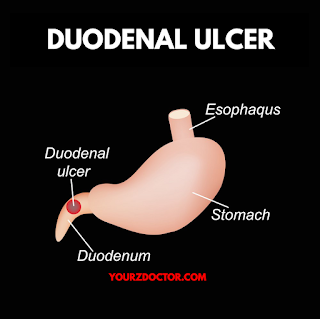Duodenal ulcer
A duodenal ulcer is a type of peptic ulcer that develops in the duodenum, which is the first part of the small intestine.
Most common Causes of Duodenal ulcer:
Duodenal ulcers
are caused by an imbalance between stomach acid and protective factors in the
duodenum, such as the mucus layer.
The most common cause of duodenal ulcers is an infection with the bacteria Helicobacter
pylori (H. pylori). These bacteria can damage the protective mucus layer in the
duodenum and stomach, allowing acid to irritate the underlying tissue and cause
an ulcer to form. Other factors that can contribute to the development of duodenal ulcers include:
·
Regular use of
non-steroidal anti-inflammatory drugs (NSAIDs) such as ibuprofen and naproxen,
which can irritate the stomach lining
·
Excessive alcohol
consumption
·
Smoking
·
High stress levels
·
Family history of peptic
ulcers
It's also worth noting that, in rare cases, a duodenal ulcer can be caused by a
condition called Zollinger-Ellison syndrome, which is characterized by the
overproduction of stomach acid. This is a rare condition and it's important to
consult with a doctor if you suspect you may have it.
H. pylori infection is the most common cause of duodenal ulcers, and it's estimated
that more than 50% of duodenal ulcers
are caused by this bacteria. If a H. pylori infection is identified as the
cause of the duodenal ulcer,
treatment will typically include antibiotics in addition to acid-reducing
medication.
Clinical presentation of a duodenal ulcer:
·
Abdominal pain, which is
often described as a burning or gnawing sensation that occurs in the upper
stomach area, and may be relieved by eating
·
Nausea or vomiting
·
Loss of appetite
·
Bloating or burping
·
Dark or black stools
·
Unexplained weight loss
·
Fatigue
It's important to note that some people with a duodenal ulcer may not experience any
symptoms. In some cases, an ulcer may be discovered during an endoscopy or
other medical procedure for a different condition. If you suspect you have a duodenal ulcer, it's important to see a
doctor for a proper diagnosis and treatment.
Symptoms of duodenal ulcer:
Symptoms of a duodenal
ulcer include
·
stomach pain,
·
nausea,
·
And loss of appetite.
Treatment of Duodenal ulcer
Treatment for a duodenal
ulcer may include medication to reduce stomach acid and promote healing, as
well as lifestyle changes to promote overall gut health. In severe cases,
surgery may be required.
Pharmacotherapy for duodenal ulcer:
Treatment for a duodenal
ulcer typically involves reducing stomach acid levels and promoting healing
of the ulcer. Medications that are commonly used to treat duodenal ulcers include:
·
Proton pump inhibitors
(PPIs): These medications reduce the amount of acid produced by the stomach
and promote healing of the ulcer. Examples of PPIs include omeprazole,
lansoprazole, and pantoprazole.
·
H2 receptor antagonists:
These medications also reduce stomach acid levels and may be used in
combination with a PPI. Examples of H2 receptor antagonists include ranitidine
and cimetidine.
·
Antibiotics: If a
bacterial infection is present, such as Helicobacter pylori, antibiotics will
be prescribed to eliminate the bacteria.
·
Antacids: These
medications neutralize stomach acid and can provide relief from symptoms such
as heartburn and indigestion.
Home remedies and natural treatment for duodenal ulcer:
In addition to medication, lifestyle changes can help
promote healing and prevent the recurrence of duodenal ulcers. These changes include:
·
Eating a healthy diet that
is low in fat and high in fiber
·
Quitting smoking
·
Limiting alcohol
consumption
·
Reducing stress
·
Avoiding foods that may
irritate the ulcer
Difference
between gastritis and duodenal ulcer:
Gastritis is the inflammation of stomach lining and ulcers are sores in the
stomach and in the duodenum.
Read more
Searching Tags
What is duodenal ulcer?
What causes duodenal ulcer?
How serious is a duodenal ulcer?
What is the treatment for a duodenal ulcer?
What food causes duodenal ulcer?
What
is the difference between gastritis and duodenal ulcer?
What
is the most common causes of duodenal ulcer?
What
are 3 main causes of duodenal ulcers?
What
is a duodenal ulcer and how is it caused?
What
causes duodenal ulcers besides H. pylori?
What
is the most common complication of duodenal ulcer?
Is
duodenal ulcer caused by stress?
Clinical presentation of a duodenal ulcer
What
is the most reliable symptom of duodenal ulcer?
What
is the most reliable symptom of duodenal ulcer?
How
long does it take to treat a duodenal ulcer?
Can
duodenal ulcer be healed?
What
foods heal a duodenal ulcer?
What
is the best medicine for duodenal ulcer?
Pharmacotherapy
for duodenal ulcer
Home
remedies for duodenal ulcers
Natural
treatment for duodenal ulcers






0 Comments